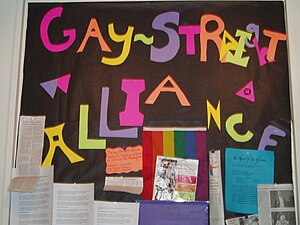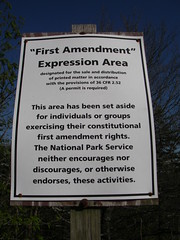I was listening to Dan Savage’s Savage Love Podcast last week and I heard about a sad but inspiring situation in West Bend, Wisconsin. East and West High Schools has had an unofficial Gay-Straight Alliance for over a decade and is currently being denied the recognition of being an official school group.
Prior to this year, student group recognition was fairly informal, and it appeared that every group that requested recognition received it. This year a new process was imposed that required a group to show that they have curricular tie, national or state affiliation, student appeal and a volunteer adviser to receive recognition by the school. The GSA complied with every requirement of the application process and their application was approved by the school district administrators.  All they needed was the approval from the West Bend Board of Education.
The students of the West and East High School GSA did a very ballsy thing – they hired an attorney who assisted them throughout this process. When the group went before the school board, their attorney warned the board members that legal action for discrimination could result if they denied the group’s request for official recognition. They walked into that meeting and basically said, “We’ve complied with your requirements. We know we have rights, and if you deny us our rights, we’re going to sue you.â€Â I love it!
The school board unfortunately voted against granting the GSA recognition. Randy Marquardt, president of the board of education, voted against recognition and does not understand the need for the school to recognize the GSA. He allegedly said the board should not vote in the group’s favor to avoid a threat of legal action.
The GSA complied with the school’s requirements for recognition, and therefore they have earned the right to be an official school group. The co-presidents of the GSA have filed a federal lawsuit against the West Bend Board of Education for violations of their First Amendment rights and the federal Equal Access Act that grants all non-curriculum student groups equal access if a school recognized at least one non-curriculum student group. The students claim that they are being denied the privileges afforded to recognized student groups such as using the school’s PA system, posting flyers and posters in the school, using the school’s resources and equipment, raising funds for group activities, and being included in the school yearbook.
These students should be applauded for their determination and for refusing to sit in the back of the proverbial bus. Their group’s mission is “to combat bullying and harassment through education and advocacy and to provide an emotionally and physically healing learning environment for people of all gender and sexual orientations.â€Â The GSA has only asked for a declaration that the board of education violated rights, a court order requiring the school to recognize the GSA as student group, less than $20 of damages and attorneys’ fees. They are not asking for anything spectacular, only for what is fair.
To the students in West Bend, keep fighting the good fight. I was pleased to hear that the community for the most part seems to support you. Please let us know what we can do to continue to support you and your cause.
If you want to send Randy Marquardt a message urging him to allow the GSA to be an officially recognized student group, you can email him at rmarquardt@west-bend.k12.wi.us or call him at 262-306-2601.
UPDATE: On Monday, June 13, 2011, in a re-vote the West Bend School Board approved the request for an official GSA at West Bend High School. It appears that the school board caved because they were advised that if they fought the lawsuit filed against them, that they would lose. Randy Marquardt had the audacity to say that the board was bullied by the GSA and that he still does not approve of giving the group recognition as a student club. Regardless of why the board approved the GSA, it was the right thing to do. Congratulations kids!
Related articles
- Gay Straight Alliances – a way forward. (therainbowpost.com)
- The West Bend School Board Has Never – Not Once – Rejected an Application to Form a School Club (slog.thestranger.com)


![Reblog this post [with Zemanta]](http://img.zemanta.com/reblog_e.png?x-id=95f0d2b9-3d01-4054-ac2f-2c7b782a6a92)

![Reblog this post [with Zemanta]](http://img.zemanta.com/reblog_e.png?x-id=38c6d8a4-be05-4572-ab01-51474b99805d)